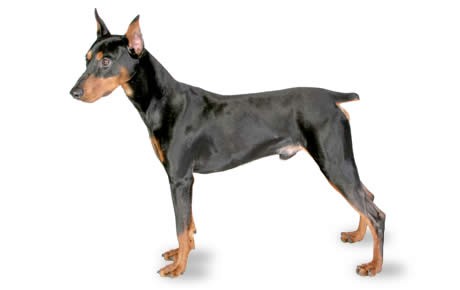German Pinscher Breed Guide

Breed Group:
Working Dogs
Get 30% off
Join our Newsletter
Sign Up Today
German Pinscher Background & History
Originating from Germany back in the 1700’s, the German Pinscher’s sole purpose was to hunt vermin on farms. Even today, the German Pinscher’s prey drive remains as strong as ever, and will instinctively hunt small rodents whenever given the opportunity.
Sadly during the world wars, the German Pinscher struggled to stay in existence. If it wasn’t for one man by the name of Werner Jung who took it upon himself to preserve this breed, they may have disappeared entirely during this harsh time in history. Later on, this hunting breed served as the foundation for several other breeds including the Doberman Pinscher and the Miniature Pinscher.
It wasn’t until the 1980’s that the German Pinscher finally made it to the United States. Unlike most breeds, these dogs had a late introduction to America and weren’t registered by the AKC until 2003.
German Pinscher Temperament & Personality
Although the German Pinscher may be small and cute, do not underestimate them for a passive breed. If not watched closely, they will take advantage and run the household. That’s why it is important to establish yourself as the one in command as early on as possible. Firm and constant training is highly recommended for this breed.
Aside from their bold personalities, German Pinschers are also surprisingly playful, and will remain that way well into their adult years. They are also impressively loyal and will stand by you and seek your attention at all times.
German Pinscher Training
As previously stated, the German Pinscher needs constant training to be a well-behaved pet. However, once you are able to get through to them, they can be very fast learners. The German Pinscher is an intelligent dog breed and should be challenged on a regular basis to keep them entertained. If you are having trouble training your German Pinscher, try enrolling them in a puppy obedience course for professional assistance.
German Pinscher Exercise
The German Pinscher has lots of build up energy, and they’ll need some type of outlet to release it. Daily exercise is critical for this breed to ensure optimal health and happiness.
When it comes to German Pinschers, the bigger the yard, the better. These dogs love nothing more than to run around and play with their toys. Whatever you do, make sure your German Pinscher plays in a secured and closed-in area. This breed is known for their infamous escape tactics, so don’t try and test this breed’s capabilities.
German Pinscher Lifespan
The German Pinscher has an average lifespan of 12 to 14 years.
German Pinscher Popularity
Due to their recent entry into America, the German Pinscher is still a fairly new breed. Right now, these dogs are ranked 146th on the most popular dog breed list by the American Kennel Club.
German Pinscher Feeding Requirements
The German Pinscher requires 1 to 2 cups of high-quality dog food a day, split into two equal meals. Be sure to use dog food that has all natural ingredients and no preservatives or fillers. What you feed your pet has a major influence on his overall health. Aside from the food intake, make sure to keep a bowl of fresh water readily available at all times.
German Pinscher Grooming
The German Pinscher has a short and dense coat that requires minimal grooming. To mitigate their shedding, brush their coat regularly to rid any dead hair or debris. Along with their coat grooming, brush their teeth at least once a week to reduce plaque and tartar from building up. Lastly, be sure to trim your German Pinscher’s nails every couple of weeks to prevent overgrowth or infection.
Are German Pinschers Good With Kids?
As long as a German Pinscher has been raised with children around the house, they should have no problems interacting with them. However, since this breed can be domineering at times, it is recommended that the kids be older than 10. As long as both the German Pinscher and child know how to properly interact with one another, there should be no major issues within the household.
German Pinscher Health Problems
Although this breed is fairly healthy, they are still susceptible to several health complications. German Pinscher health problems include:
Cataracts: Eye issues are a common complication that can affect any breed. Cataracts in dogs occur when the lens of the eye turns cloudy, which will progressively hinder the dog’s eyesight. In severe cases, surgery is recommended to remove cataracts.
Hip Dysplasia: Just like in most large dog breeds, hip dysplasia is a common health problem that may develop. This hereditary issue occurs when the hip socket and the thighbone do not properly fit together. Hip dysplasia in dogs will then lead to pain, lameness, and eventually arthritis.
Dental disease: Dental disease is a major threat to German Pinschers. Dental disease is caused by excessive plaque buildup, which leads to infection and deterioration of the gums, jaw bone, or teeth. Brushing your German Pinscher’s teeth on a regular basis can help reduce his chances of developing this disease.
Other Resources
National Breed Website: The German Pinscher Club of America





